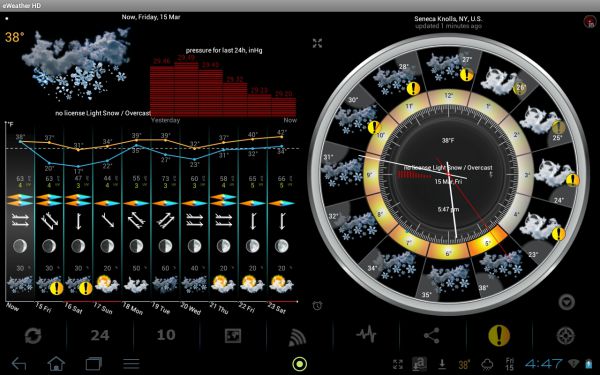HOME
TOPICS
ABOUT ME
Apple's closed environment is so hush-hush and limited in scope that errors are almost guaranteed in any truly complicated project.
Starting our fourth decade: Al Fasoldt's reviews and commentaries, continuously online for 30 years

HERE'S A WEATHER STATION on an Android tablet. Android is sometimes considered a lesser mobile operating system compared to Apple's iPad and iPhone system, but apps like this one -- eWeather HD -- show an incredible sophistication in Android.
Android's secret weapon
March 24, 2013
By Al Fasoldt
Copyright © 2013, Al Fasoldt
Copyright © 2013, The Post-Standard
You buy a Samsung phone and your neighbor buys an iPhone. They look pretty much alike. Yet one of them has a gigantic advantage -- one that most people don't know about.
Or you buy a Google Nexus tablet and your sister-in-law buys an iPad. They look the same except for a few odds and ends. Yet hidden in the design and manufacture of one of them is a monumental difference. Ask 10 people at random what that difference might be, and you'll get 10 wrong answers.
The secret isn't on the outside. It's what's inside that counts -- the operating system. Apple has dozens of engineers working on the way the iPhone and iPad work. Android, the project responsible for almost all the phones and tablets that compete with Apple's devices, has thousands. And most of them don't even get paid.
Android is Open Source. It's a community project, and the community is the world.
It's not the first to do this. Linux did it first. In fact, down inside, past the menus and pretty icons, Android is Linux, too. It's what's called a "fork" of Linux -- a version that goes off in a different direction. Android is the foster child of Google, which tries to keep the operating system headed in what it thinks is the right direction.
But Google's in-house Android programmers get a lot of help. Anyone who'd like to improve Android can do so, without needing Google's permission. All Google asks, in the standard way Open Source projects are run, is that improvements be made available to all.
This is so cool that it's hot. Open Source software can only get better as the months go by. There's no incentive to do a rush job.
Improvements get tested thoroughly in nearly every case. If you have 10 programmers and testers on your team, one of them might miss something that no one else would catch. If you have 1,000 times that many, some of them might miss problems and bugs, but chances are somebody else -- a lot of somebody elses, in fact -- will almost surely catch them.
Apple's mobile operating system, called iOS, is the opposite of Open Source. Apple is in charge, not you. Apple would love to hear any gripes or suggestions you have, but Apple does not want you to mess with the software. Unlike Open Source projects, which are open to public scrutiny, Apple's iOS is the essence of security. Ft. Knox has nothing on Apple when it comes to security and secrecy.
Apple's closed environment is so hush-hush and limited in scope that errors are almost guaranteed in any truly complicated project. Apple's disastrous Maps software, which left entire cities out and told users to follow crazy-quilt roads, is just one example of what can happen when software is developed away from the scrutiny of thousands of enthusiastic, knowledgeable volunteer programmers.
So in case you've been assuming that Apple's highly paid programmers will surely do a better job at designing phones and tablets than some upstart project with a funny name, think again. Open Source is not only a better way to assure quality; it's a cheaper way. And there's no secret to designing and building tablets and phones. Apple wants you to think there is something special about its products, and indeed they are nice. At a cost Android quite happily avoids.